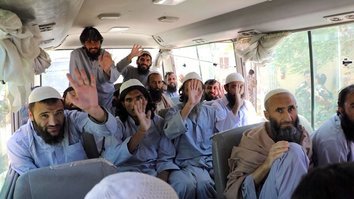KABUL -- Appeals for the Taliban to extend a ceasefire with Afghan forces went unanswered on Wednesday (May 27), but there were no reports of major violence and the militants said they would release some government prisoners.
A three-day pause in fighting that ended on Tuesday (May 26) provided a rare respite, and Afghan authorities called on the Taliban to extend the ceasefire so delayed peace talks could begin.
"If the Taliban are ready to extend the ceasefire, we are ready to continue the ceasefire too," National Security Council spokesman Javid Faisal said May 26.
The future of talks with the insurgents "depends on the Taliban's next move", he added.
The group has not yet responded, but by early afternoon May 27 no major security incidents had been reported.
The historic pause in fighting -- only the second in almost 19 years of conflict -- saw Afghan authorities release about 1,000 Taliban inmates, most from Bagram prison in Parwan Province.
The release is part of a pledge by the government to free up to 2,000 insurgents in response to the Taliban's ceasefire offer.
On May 27, a senior member of the Taliban told AFP that in return the insurgents were planning to free about 50 to 100 Afghan security force members as early as Thursday (May 28).
Permanent ceasefire
The release of prisoners by both sides is part of a US-Taliban deal agreed to in February.
The deal stipulates the Afghan government would release up to 5,000 Taliban prisoners and the militants would free about 1,000 security personnel.
Kabul had already freed about 1,000 Taliban inmates before the ceasefire, while the insurgents had released about 300 government captives.
Abdul Wasi, 27, from Kandahar Province, much of which is under Taliban control, said he was a "holy warrior" when he was detained eight years ago.
"I was told ... to do jihad until all foreign troops are driven out of our country," Wasi, sporting a long beard and wearing a traditional baggy shirt-and-trouser shalwar kameez, told AFP moments after he was freed.
He said he was happy about the US-Taliban deal paving the way for all foreign forces to quit Afghanistan by May next yea, and that he wanted a permanent ceasefire.
"If the foreign troops exit, we won't fight," he said as he boarded a Kabul-bound bus along with other freed Taliban members.
The prisoners had signed written pledges not to return to the battlefield, but Qari Mohammadullah, another freed inmate, vowed to continue fighting if foreign forces remain in Afghanistan.
"We don't want foreigners to stay any longer in our country; they must leave immediately," Mohammadullah said. "We will continue our 'jihad' until every single foreign force leaves."
Each freed inmate received 5,000 AFN ($65).

![Taliban members leave prison on a bus in Parwan Province on May 25. The Afghan government has released about 1,000 Taliban prisoners across Afghanistan, with approximately 600 of them from the Bagram prison in Parwan Province. [Afghan National Security Council]](/cnmi_st/images/2020/05/27/24229-ey3drenxkaabqmx-585_329.jpg)







We strictly urge the United States to put an end to the issue of war in Afghanistan as soon as possible. The United States began this war 19 years ago and it continues up to now. Now the United States must end this war. If the United States withdraws from Afghanistan and does not put an end to the war, it will be responsible for all the miseries and killings that will take place between the Afghan government and Taliban after the withdrawal of US troops. If the United States wants, it can change the situation in Afghanistan, because United States has money, United States has power, it has an effect or influence on the region and the countries of the world. If the United States imposes even 30 percent of the economic pressure on Pakistan as it imposed on Iran, Pakistan will be ready to bring Taliban to the negotiating table with the Afghan government. The United States can end the Afghan war by distributing money to the poor people in rural areas of Afghanistan. If it gives $ 5,000 to each poor family in Afghanistan and then that family will no longer send their son to join the ranks of Taliban. The United States can end the war in Afghanistan by building factories. It should build a factory in each district to provide job opportunities for the people, and in the factories, they should try to employ Taliban fighting forces as well as Taliban prisoners who are being released so that they do not return to the battlefield. These were few solutions to end the war in Afghanistan; th
Reply2 Comment
Yes, if the Afghan government makes peace with Taliban and Afghanistan reaches to peace, we are 100% optimistic about the future of the country. People of Afghanistan will very soon have a developed country with good economy. If the Afghan government makes peace with Taliban, I am sure that poverty and hunger will decrease in the next one decade, because war is the main cause of poverty and hunger in Afghanistan. If there is no war in Afghanistan, people themselves will invest in this country and build companies and establish production factories and make their country self-sufficient, and this war will only end in the country if peace is made with Taliban, because they are Taliban who have paved the ground for other militant groups such as ISIS and so on. If peace is made with Taliban, ISIS will not be able to remain in Afghanistan for even a month. So Taliban is the objective reality of Afghan society. At least half of Afghanistan's territory is ruled by Taliban, so we should not ignore Taliban and we should not insist that we can destroy them through war. We should sit with Taliban and reach to an agreement with them about the future government; otherwise, peace in Afghanistan is not possible. With regards
Reply2 Comment